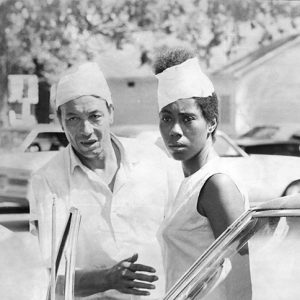calsfoundation@cals.org
William Ezra Greer (1925?–?)
William Ezra Greer was a minister and civil rights and social activist in Arkansas in the 1960s and 1970s.
Ezra Greer was born in Illinois around 1925, but a lack of documentation makes it impossible to identify his exact date of birth. Not much is known about his early life, but early on he became a minister with the Church of God in Christ. He became particularly active in the Church of God in Christ’s department of evangelism and directed the public relations efforts of the church. Greer also served as a “national evangelist” for the church and conducted revivals around the country. He appears to have been assigned to Alabama; settling in Birmingham in the early 1950s, he served as an associate minister in Birmingham’s Smithfield Church. He would later become the pastor of the Trueway Evangelist Temple in Birmingham. He would subsequently move to Selma, where he was involved in the Selma voting rights campaign, serving as assistant coordinator for the out-of-region clergy who came to participate in the march. He was reported to be the executive coordinator of the Selma Emergency Relief Fund, and following the murder of activist Rev. James Reeb, Greer led a vigil in Selma.
Despite these efforts, Greer’s status in Selma and in the movement soon became controversial when Greer found himself fighting a series of legal charges. The first set of allegations involved embezzlement and was initiated by a group of local African Americans. Charges were never filed against Greer—and, in fact, another worker was later indicted in the case on the same charges. A more damaging charge involved Greer and several young girls. In addition to being charged with possessing pornography and using profane language before the girls, he was accused of fondling some of them. In the summer of 1965, Greer reached an agreement with prosecutors, pleading guilty to the lesser charge of using the profane language, a crime for which he was fined $25. In addition, he was tried and convicted of assault, but when his lawyer promised that Greer would leave Selma, his six-month jail sentence was suspended. The incident was a public relations problem for the civil rights movement, for when Greer was arrested, officials said he had cards that showed he was affiliated with both Martin Luther King Jr. and his organization, the Southern Christian Leadership Conference (SCLC). However, Alabama SCLC officials were quick to deny any official ties to Greer, making clear that he was not a member of their staff.
Leaving Selma, Greer returned to his evangelical roots, again conducing a series of revivals as part of a campaign that took him to Arkansas. Arriving there for the first time around 1966 or 1967, he conducted a revival in Crittenden County that lasted for about ten days. During this visit, he apparently met a lifelong resident of Earle (Crittenden County) named Jackie. The couple married on New Year’s Day 1968, and he immediately relocated to the area. Upon arriving in Earle, Greer became active in the community, with his first major campaign being a 1968 effort to get the town dump moved from the black section of town. He also sought to integrate the local public swimming pool. While he met with initial opposition, both goals were ultimately achieved.
In part because of these efforts, Greer was viewed by the white community as a troublemaker. But he continued to pursue his social justice agenda, leading numerous marches, a continuation of his longtime commitment to non-violent protest.
To complement his efforts, Greer founded the Crittenden County Improvement Association, of which he served as coordinator. The town’s white residents viewed it as a “militant” group, and that perception was only reinforced when Greer undertook an effort to address the town’s educational imbalance. In defiance of legal pronouncements, the town’s schools remained segregated, and the black schools substandard. Black students were not allowed to participate in co-curricular activities, and according to critics, even the roll was called separately. In protest, Greer organized a boycott by black students of the inadequate school. At the same time, not wanting to interrupt the students’ education, the Greers established the Soul Institute to provide schooling for the students who engaged in the boycott at the start of the 1970–71 school year.
Things came to a head on the night of September 10, 1970, when more than 150 black citizens (some put the number at closer to 300) organized by Greer marched on City Hall, to be confronted by a group of about thirty whites. As police and state troopers came on the scene, shots were fired, and a bloody melee ensued. Greer and his wife were in the center of what became known as the Earle Race Riot. Greer suffered a head injury requiring twenty-eight stitches, as well as a broken arm and a fractured rib cage. His wife’s head was grazed by a bullet. The violence continued into the morning. Tensions remained high while Greer, after being arrested and then taken to the hospital in Memphis, Tennessee, was charged with inciting a riot. The following January, Greer was sentenced to a year in jail and fined $500 after being found guilty of the incitement charge. The judge suspended the jail sentence and waived all but $100 of the fine.
In addition to their protest efforts that fall, Ezra and Jackie Greer both sought elected office in the county. Ezra, a candidate for alderman on the city council, lost to incumbent Watt Campbell. Meanwhile, Jackie Greer, who was a candidate for mayor, was overwhelmingly defeated by incumbent Jimmy King. However, despite the violence and the electoral loses, Greer did see results from his efforts when, on October 2, 1970, District Court Judge G. Thomas Eisele ordered the complete desegregation of the town’s schools.
Following the riot and the school decision, Greer continued his efforts but broadened his agenda. In 1971, he called for the Arkansas Advisory Committee to the Commission on Civil Rights to be replaced, and that same year, as head of the Delta Coalition of Eastern Arkansas, he called on the state’s congressional delegation to address issues of equal employment, police brutality, welfare, and education. In 1973, he turned his attention to improving minority business opportunities. Again using the Delta Coalition of Eastern Arkansas as a platform, amidst reports of mismanagement of federal funds, Greer called for a wholesale change in the board and staff of the Arkansas Business Development Corporation (ABDC) and the Community Investment Development Inc. (CIDI), saying that the reported efforts were reflective of their lack of efforts on behalf of minority businesses.
Following these efforts, Greer seemed to adopt a lower profile, dropping from the news but continuing his ministerial role in the local church. He later died in Chicago, Illinois.
For additional information:
“Arrest Selma Rights Worker on Sex Charges.” Jet (July 8, 1965): 48.
Chase v. Twist. https://www.leagle.com/decision/19701072323fsupp7491960 (accessed July 11, 2019).
“Slate Report to Arkansas Governor on Brutal Beatings.” Jet (October 22, 1970): 6–8.
Soul Institute Records. Arkansas State Archives, Little Rock, Arkansas.
William H. Pruden III
Ravenscroft School
 Civil Rights and Social Change
Civil Rights and Social Change Divergent Prosperity and the Arc of Reform, 1968–2022
Divergent Prosperity and the Arc of Reform, 1968–2022 Religion
Religion Ezra and Jackie Greer
Ezra and Jackie Greer 



Comments
No comments on this entry yet.